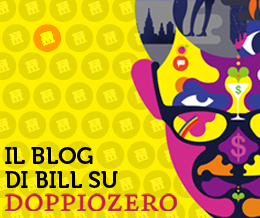Questa rivista è dedicata a William "Bill" Bernbach.
La sua visione della pubblicità - civile, mai banale, basata sulla verità - appare sempre più attuale.
Benvenuti e buona visione.
Q: You write that the only true prediction about the future is you’ll almost certainly be wrong. So I understand that a question about the future of advertising is very banal. To make it a little less banal, I could twist it this way: do you still believe this is the best time to be in advertising?
JH: This is undoubtedly the best time to be in advertising. As more brands compete for more attention and as technology explodes around us, the skill to reduce complex ideas down to simple memorable persuasive messages becomes even more valuable.
Q: I was touched when reading in your book that advertising has to have integrity and humanity, whereas it seems to me that is becoming more and more ruled by cynicism. Could you explain what do you mean exactly, tell us something about the importance of integrity and humanity in our profession?
JH: The most compelling long term strategy any brand can employ is the truth. The skill is to express it in a way that is memorable. Truth is at the heart of any brand. The way to build trust is embrace truth.
Q: You write that creativity is not a process, but it’s something which is basically unpredictable. Do you think it’s possible to teach (and learn) creativity?
JH: We are all creative. You don’t have to teach people to be so, just as you don’t have to teach people to walk. We do. Of course you can also teach people to run fast and you can teach people to be more creative.
Q: You wrote that Bill Bernbach and the work coming from his agency was responsible for your choice to begin working in advertising. Do you think Bill’s lesson is still valid today? And why?
JH: Absolutely. He invented modern advertising. Putting creativity and integrity at its heart. That’s as relevant today as it was back in the 60s.
Q: What do you think about the former “emerging countries”, communication-wise? From your point of observation, do you think countries like India or China, or others, which are changing the rules in many aspects of our everyday lives, are going to change the rules of the game in advertising as well? Are they going to innovate languages and codes of creativity, or not?
JH: Of course they are. Hopefully they’ll broaden our awareness of their cultures and beliefs. We’ll all learn from each other. That’s how mankind was progressed.
Q: The last one: looking at the protests against the finance firms (i.e. Occupy Wall Street and similars) this is good news for democracy, but is it good or bad news for brands, according to you? I mean, is it going to be more difficult for brands to create loyalty, intimacy, and especially confidence?
JH: No, quite the opposite. It creates opportunity for brands to build a more meaningful transparent relationship with their potential audience. But we all have to remember, trust takes a long time to build and no time to lose.



